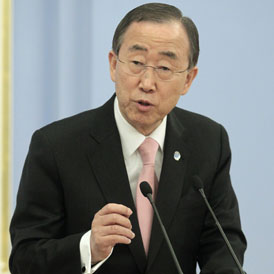Ban Ki-moon wins second term as UN Secretary General
The UN Secretary General has been unanimously approved by the UN’s General Assembly for a second 5 year term.

Mr Ban, the only candidate for the position, was unanimously backed by the 192 nation UN General Assembly to begin a second term on 1 January next year.
He declared his candidacy two weeks ago and was backed by the UN Security Council last week to continue in the role he took over from Kofi Annan in 2007.
The former South Korean Foreign Minister pledged to keep leading the world body as a “bridge-builder” in a time of unprecedented global change.
US Ambassador to the UN Susan Rice welcomed Ban’s re-election to the post of secretary-general and praised his performance in “one of the toughest jobs in the world.”
“No one understands the burdens of this role better than he,” she said, adding that Washington was “grateful that he is willing to take them on.”
All the regional groups of UN member states backed Ban, including the Latin American and Caribbean group, the last to officially endorse his re-election.
UN officials and diplomats had said Cuba, Barbados and others held up the group’s endorsement amid complaints that Ban had neglected the region. Havana denied causing a delay.
Joseph Deiss, president of the General Assembly, praised Ban for “his remarkable leadership” and for having “strengthened the role and visibility of the UN.
“In a complex, difficult international environment, you have strengthened the role and the visibility of the United Nations by adopting reform measures; launching exciting, innovative initiatives; and calling faithfully and constantly for respect for human rights, the rule of law and the other values rooted in our Charter,” Mr Deiss told the Assembly.
Mr Ban, 67, has previously said climate change is the “most important priority” for mankind.
He has also said he supports Arab protesters during this year’s wave of revolutions, vowing to speak up for the disenfranchised.
When he declared his candidacy he said that during his term the UN “responded quickly and effectively to a series of devastating humanitarian emergencies” in Myanmar, Haiti, Pakistan and elsewhere.
He added that his team also worked to keep attention on the world’s poorest people during the global economic crisis.
But critics- including some human rights group – say he has put too much faith in quiet diplomacy and has been too soft on China.